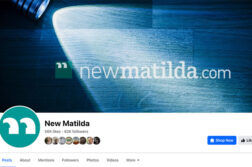Dear newmatilda.com readers,
As the year draws to a close and we reflect on 2008, we want to say thanks to those of you who responded to our recent reader survey.
We gained a lot of insight from your feedback and there were some enlightening observations in there — along with a few surprises! Here is some of what we discovered from your responses, plus a few tips and explanations in response to commonly asked questions.
newmatilda.com readers are evenly drawn from all age groups (over 18) and a wide range of backgrounds. However, all share a passion for news, current affairs and politics — no surprises there. The high number of professionals who read newmatilda.com come from a variety of industries and sectors including the media, arts, education, information technology, business, the community sector and government.
Most of you live and work in capital cities, particularly Sydney, Melbourne, Brisbane and Adelaide but there are also a small but growing number of international, regional and rural readers. Our readers are loyal — many of you have been reading newmatilda.com since its inception — and habitual, reading daily or several times a week. Readership has doubled in the past year.
In February newmatilda.com relaunched the site in its current form. We asked how you find the website in terms of usability and almost everyone (85 per cent) responded that it is either good or excellent. A few people have had difficulties with the site, and we have responded to some of these individually. One issue in particular is the black background which displays as the site loads in some readers’ browsers. We’re looking into this problem and hope to have it resolved soon.
Some readers expressed frustration that articles move off the front page too quickly or were too hard to find after appearing on the homepage. We thought we’d take the opportunity to explain the best way of viewing articles that are no longer on the homepage. There are a couple of options.
On the top of the homepage’s navigation menu, you may notice a new tab called "Recent Articles". Select this tab and a drop-down menu lists articles sorted by topic areas such as Australian Politics, Business and Consumerism, Global Footprint and Satire. Roll over any of these categories and you are able to view the eight most recent articles in that category.
Also on the navigation menu is the tab "Archive", this lists the 10 most recently published articles and you can scroll back page by page to earlier articles. In fact, this is where you can find all the articles we have ever published, dating back to August 2004.
Another option is the blocks displayed on the right hand side of every article page, listing "Recent Articles" and the "What’s Hot" article list.
For any specific problems or if you would like further assistance, don’t hesitate to contact us. We really do want to make visiting the site as simple and convenient as possible.
We noticed that most of you access articles via the email digest which we send out two or three times a week. A few people commented that they "don’t look at the site", that they only access the article that is linked directly to the email and this suggests they don’t realise articles can be accessed by going directly to our homepage. We thought it worth pointing out that when you follow the link to read the full article via the digest, you are actually on the site, and surrounded by other content. Take a look around!
newmatilda.com publishes on average three articles and a cartoon every weekday. The digest is really a reminder of what is on there, but does not reflect all the content so we encourage you to bookmark the site or make newmatilda.com your browser homepage. Check in to the site regularly as it is constantly changing.
You may also like to consider other ways of finding out what is new on the site, such as RSS or Twitter. Here’s a brief explanation of how these facilities work:
RSS (Rich Site Summary) is a format for delivering changing web content, primarily through web browsers. Most browsers have add-on RSS readers. For Firefox, check the Mashable site for a guide to RSS in Firefox. For Internet Explorer 7, check the Microsoft site for a guide to RSS in IE 7. For more information on RSS and guides to adding RSS feeds, check the site: What is RSS.
Twitter is a microblogging and social networking service, that allows you to post information such as what you are doing or what you are reading, known as "tweets". It also provides updates from others you are "following" which may be friends, colleagues or other entities such as media sites. Once you set-up a free Twitter account, you can receive updates of newmaitlda.com content by following us at: http://twitter.com/newmatilda. More details and guides to using Twitter are available here.
Many of you (68 per cent) share articles by emailing them through your own networks and contacts. You can also share our content through other websites by using some of the "Share" icons on each article page. More information on the share facilities are available here.
The majority of newmatilda.com readers describe the content of our articles as intelligent, relevant, original, independent, an alternative source of information to the mainstream media and offering in-depth and up-to-date analysis.
Obviously your reasons for reading newmatilda.com reflect this — people say they come to our site for reliable, critical, concise, progressive, left-leaning journalism and for good background and overview on current affairs. Some readers have criticisms – earnest, elitist, sometimes sarcastic and predictable were the most common.
newmatilda.com doesn’t primarily seek to break news but rather offer deeper analysis and commentary on news stories. Our articles tend to explore the "why" about events of public and social importance, rather than the "what" and assist readers in understanding issues, rather than just knowing about them. The feedback tells us you value this approach.
Many people (82 per cent) read the comments but the majority of readers don’t add their own — only 25 per cent of respondents said they posted comments on the site. There were some concerns raised about the "same old voices" making comments. Many readers stated that they don’t comment because they feel they don’t have anything to add. Diversity in the comments is welcome, including short responses — whether they be positive, negative, simple, complex or posing further questions.
Most people said that they wanted to see more independent analysis, satire and commentary on Australian state and federal politics, as well as more on the media and current affairs, than is currently published. Responses to this question show us that you also want to see more on climate change and international affairs.
There were plenty of suggestions for new content — from religion to death metal, peace to public policy and solutions-based discussions, as well as several cries for no sport on newmatilda.com.
Next year, newmatilda.com will continue to investigate particular themes — the future of journalism, the media and technology, resource wars, Indigenous politics and government responses to climate change are areas that we are interested in pursuing with more vigour.
A common request was for more "investigative journalism". This raised some interesting questions for us and we wished that we had given you the space in the survey to be more specific. Keeping in mind that we have a small budget and do not have the ability to do long-form investigations, we’re interested to know what kind of investigative journalism you think an outlet like newmatilda.com should be doing more of.
There was also a chorus of encouragement to be braver, more challenging and take more risks. This, we will gladly take on board. Thanks for your support in 2008 and we look forward to raising a few more eyebrows in 2009!
The newmatilda.com team
Donate To New Matilda
New Matilda is a small, independent media outlet. We survive through reader contributions, and never losing a lawsuit. If you got something from this article, giving something back helps us to continue speaking truth to power. Every little bit counts.



